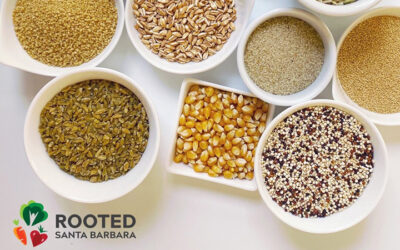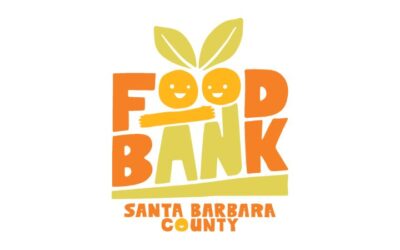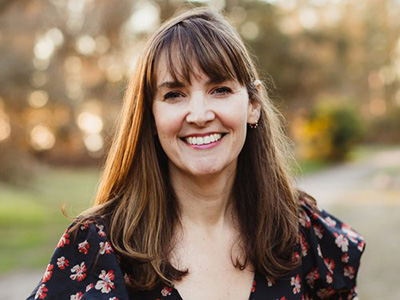
Photo Credit: Rhonda Lee Johnson
When my husband was diagnosed with Type 1 Diabetes as an adult, it came out of left field – it wasn’t something that ran in his family and it’s a hard diagnosis. Thanks to modern medicine, he’s able to live a healthy life – albeit dependent on insulin indefinitely and there’s a range of potential complications and dramatically increased risk for other conditions like heart disease. We were always looking for ways to help him live better with Type 1 though. A friend’s father very kindly shared a book that a doctor had shared with him – The China Study. The book reports on an extensive study by T. Colin Campbell, PhD that mapped lifestyle factors throughout rural and urban communities in China and found strong associations between the foods that were eaten and patterns of chronic disease. The study found that in urban areas where inhabitants were eating closer to the Standard American Diet (high animal-based and processed foods), there was a higher instance of disease for many of the most common chronic diseases and conditions that we’ve become all too used to in the U.S. And in areas that ate more traditional, plant-centered diets, rates of these conditions dropped significantly. It included discussion of autoimmune diseases, including Type 1. My husband became so compelled by what he read, that he wanted to give plant-based eating a go.
Where Our Journey Began
In 2011, we were in Cottage Hospital and I was being induced for the birth of our first child and this was our “small talk”. He’d just finished the book and wanted to start then and there and see what would happen if he took three months to go entirely plant-based. I’d always supported him and wanted him to live better so without hesitation, regardless of the less than ideal timing, I was all in. There weren’t any plant-based options at the hospital but we started then and there with three totally plant-based salads from the deli across the street. On the day that I became a mother for the first time, we also began an entirely new journey to health, and little did I know at the time, my next career.
After just a few weeks we already began to see benefits but after three months we stopped, had a hard look at each other and realized that this was it – there was no going back. His blood sugar control improved significantly, his highs and lows were far less pronounced, and his insulin usage went down. We noticed that if he did accidentally (or purposely) eat animal-based foods, it would take his body approximately two weeks to get back on track to his new normal and that was the real clincher for us. It wasn’t worth it – we wanted to go all in and so we decided together that this was how we’d raise our family.
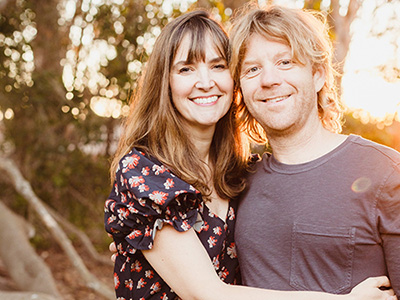
Photo Credit: Rhonda Lee Johnson
A New Way of Life
I needed to understand plant-based eating completely, especially with a new little one, and so despite being a new mom and just starting back to work, I spent every other waking hour I could find reading about plant-based nutrition and searching for cooking resources. I became so compelled by the opportunities for reducing our risk for a range of conditions and grew more passionate about how this lessened our impact on our world in other ways. There were no local resources for us to turn to and, for the first five years, we didn’t know anyone who was eating plant-based. We became, by necessity, our own best guides. I began to discover national resources and enrolled in a plant-based nutrition certificate program through the T. Colin Campbell Center for Nutrition Studies. My passion grew exponentially from there. To my pleasant surprise, I then began to experience my own health benefits; I lost weight and found a healthy new managed weight, my vision improved and I felt great. I went on to have two entirely plant-based pregnancies that were significantly smoother and with less undesirable side effects than my first. I had a really hard time during my first pregnancy with excess weight gain, acne, rashes and carpal tunnel. But I felt really good for the next two! I loved the way I felt and while we started for my husband’s health, it’s become additionally meaningful for me finding my own unique health wins that were results of my lifestyle change.
My Catalyst for Rooted
I was so in awe of my family’s health progress and a few years in, I tried to share my family’s story with the local healthcare community to garner resources and interest. I knew this wasn’t unique to my family. I experienced as many people excited to hear our experience, as I did those who were quick to dismiss. I realized how plant-based eating as a healthcare option wasn’t something that was going to be easily embraced – it’s often so wrapped up in fear and misunderstandings and food is personal to whomever you’re talking to, even in a professional setting. As my career shifted and my family grew, I went back to school to get my Masters Degree in Applied Clinical Nutrition so that I had more than my family’s story to work from. I launched a website, Plant Based Santa Barbara, and began to create a resource that I wish I had, that made it easier to live plant-based as a family in my own community. I then started to meet others in the community who were also passionate about plant-based eating for health and I saw the potential to work with others to elevate this as a healthcare option in our community. I met people I would have loved to have learned from and had support from on my journey – and Rooted Santa Barbara County began to take shape.
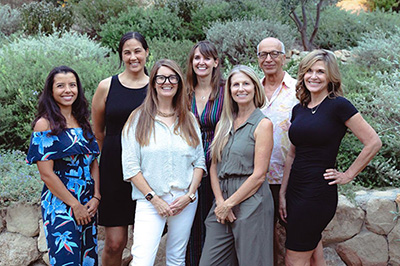
Fall 2022 – Rooted Santa Barbara County Board Members Daniela Cadavid, DDS, Andrea Light, Emma Malina, Beth Skidmore, MSACN, Jenifer Swartzentruber, RD, George Ayoub, PhD, Beth Prinz, MD (Not pictured Leonie Mattison, EdD, MBA) Photo Credit: Rhonda Lee Johnson
My background is in nonprofit fundraising. I spent the majority of my professional life fundraising for local arts organizations, the majority of that time was at the Santa Barbara Bowl. I’ve seen how nonprofits can affect change, build community, create investment opportunities for new and innovative solutions, and have a place at the community table. Four years ago I sat down and mapped out what a nonprofit initiative could look like and started having conversations with people in the community. It’s been hard and it’s been hopeful. I’m so proud that the vision has grown beyond my initial map and taken on a new shape reflective of a community of voices and innovators, passionate about empowering community health with plant-based nutrition.
Eleven years later, I’m a mother of three and I feel more strongly about the opportunity plant-based eating offers by the day. I love raising my family plant-based – it’s one of the most meaningful decisions I’ve ever made. One of my earliest thoughts, when we realized how powerful a plant-based lifestyle could be, was why isn’t this being talked about and why isn’t it the first option offered within the healthcare system for prevention and taking care of you and your family after a diagnosis? Plant-based eating is not a silver bullet and the food we eat isn’t the full picture of our health, but it’s arguably the most significant. I believe everyone has the right to understand the power of food to drive or challenge health and the support to take our best shot at our happiest, healthiest, most fulfilling lives.
There’s power in our plates.
Talking about plants can be a hard conversation. It seems extreme and restrictive but really it is full of opportunity – and can be so, so delicious! A friend cared enough to plant the seed for us, and I will forever be grateful. I’m grateful for my friends at Rooted who are passionately working to plant this seed with our community and grow a resource that I believe we all deserve to have in our courts, cheering us on and supporting our healthcare community to fully understand, support, recommend, and help our community navigate this option of care.
A nutritious diet can improve many health conditions such as high blood pressure, high cholesterol, and diabetes, but this is not a substitute for medical advice. Always consult your healthcare team when making lifestyle changes, even healthy ones. Your doctor can offer medical guidance, individual support and adjust medications, if needed.
Beth Skidmore, MSACN is Chair and Volunteer Executive Lead for Rooted Santa Barbara County. Beth is a whole food plant-based nutritionist with a master’s degree in Applied Clinical Nutrition, public health advocate, mother of a plant-based family, and a nonprofit fundraising professional who has helped build community around shared missions for local and national nonprofits.
Ingredient Spotlight: All About Grains
I’d like to believe there’s a general consensus that whole grains are an important part of a healthy diet. I mean, if...
Recipe: Crispy Fingerling Potatoes
Enjoy this satisfying snack or side by local recipe author Rashmi Sethi! These delicious potatoes layer flavors for a...
Partner Highlight: Foodbank of Santa Barbara County
The Foodbank of Santa Barbara County is committed to moving the community from hunger into health. They find solutions...
Supporting Our Work - We’re currently an all-volunteer organization and we see incredible room and need to grow over the coming year. We understand that this time has enormous challenges for everyone, so while we’ll be seeking support to help roll our vision forward, we’re also thinking creatively to keep our costs low to efficiently build resources and deliver programming at low to no cost to our community. If you’d like to support our work, we hope you’ll consider making a donation to one of our giving programs through our community partner, the Santa Barbara Foundation!

